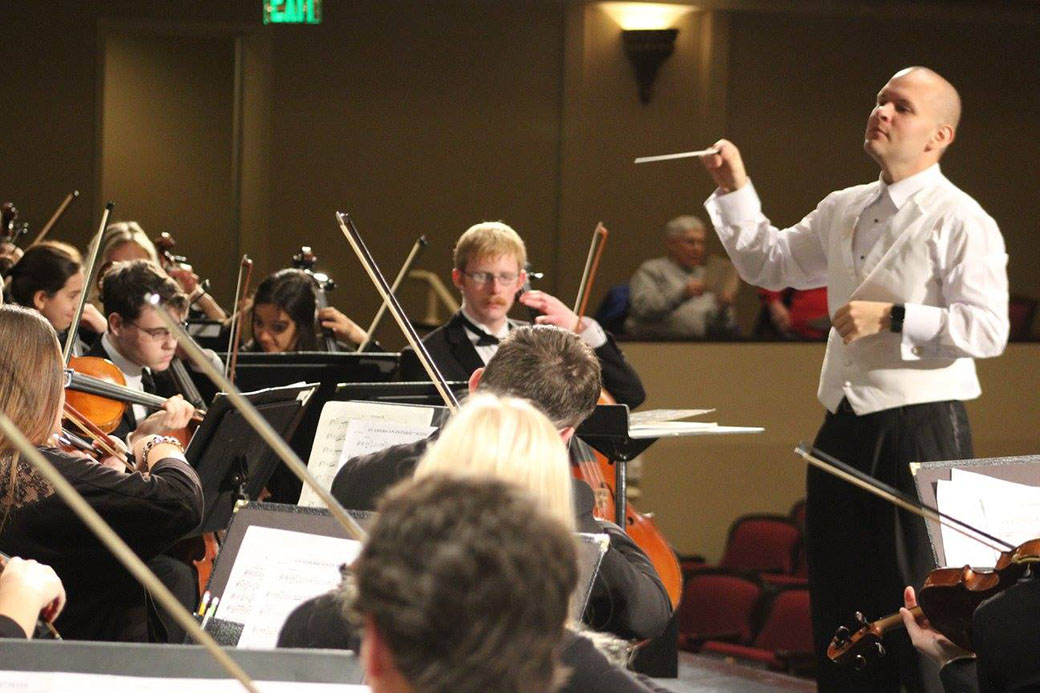
Students and faculty find music work challenging, rewarding
For USD music professor Luis Viquez, music is a way of life.
He started paying clarinet when he was only eight-years-old, and by age 18 he was a musical conductor in his native Costa Rica. Today, Viquez is the director of USD’s Symphony Orchestra. Since coming to USD this year, Viquez said he loves to challenge the orchestra in ways students never knew were possible.
Graduate student and guest conductor at the winter concert Kayla Nunnery said Visquez has done a lot for the orchestra.
“He has made this orchestra sound absolutely amazing. He doesn’t even let the little things go he kind of just makes sure that everything is going to be perfect,” Nunnery said. “His conducting is very emotional and makes us feel what the piece is supposed to be about.”
Senior music performance and kinesiology double major Liz Pekas said the work Visquez has done has been helpful.
“He has such a drive to help everyone and have them do well. He really pushes us to do our best. He’s really picky about our music which I think is a huge aspect in performance,” Pekas said. “His conducting style is phenomenal.”
Pekas also said she enjoys the fact that Visquez specializes in her instrument of choice.
“It is really cool that I play clarinet and I’m being conducted by a clarinetist,” Pekas said.
Visquez said the students are the best part of the job.
“I really enjoy that I get to work with students that are not music majors, but they still want to be involved with music,” Visquez said. “For example, some of our principle players in the string sections are not specifically music majors but they are still doing a great job.”
Viquez said the orchestra ranges from 50 to 60 students depending on the semester, as many will be graduating or moving on to student teaching. He said this is a good number and they match the size of the South Dakota and Sioux City Symphony.
The orchestra rehearses Mondays and Wednesday evenings, and for many students, even rehearsals can be a challenge.
Sophomore music major Austin Herrboldt said staying motivated can be challenging at times.
“Staying motivated during the two-hour time period I would say is the hardest,” Herrboldt said. “I’m in percussion and I might not play for 40 measures so keeping focused is definitely very hard.”
Music can be surprisingly time consuming for students, Pekas said.
“The music is hard. When we play longer pieces it gets challenging. It’s hard to balance. It is more time consuming than people think,” Pekas said. “I’m required to be in certain ensembles and I’m not getting credit for them, yet I still am required to be in them.”
Although the students are challenged by orchestra, there are still a lot of things they like about being involved in it.
“I’ve always loved music,” Pekas said. “I’ve always had a passion for it. It’s a lot easier to express yourself and your thoughts through music than through words and I think that’s where it really grabbed me as a person. My words tend to be very harsh and condescending so it’s a lot easier to play through my instrument and sound nice.”
Herrboldt’s passion for music is also why he joined orchestra.
“I want to make music for the rest of my life,” Herrboldt said. “The biggest reason I became a music major (was) because music is a way to express yourself without really describing yourself or what’s really going on in your life. I want to help students realize that life can be so stressful but you have to find those things that take away those pressures.”
There are two types of students Visquez has, and he takes two different approaches for the students in each category.
“My students that are music majors I want them to learn how to teach, I want them to how to develop a successful music program,” Visquez said. “With my non-music majors, I want them to be aware that arts are important in our lives. Because you never know, the person that is playing in the back of the viola section may be a future senator, that would be an important patron for the arts.”
Visquez is also the director of the concert band at USD and encourages all students to join concert band and orchestra. As far as Visquez is concerned, the more people that participate in music, the merrier.
“I think that the more the students get to appreciate the arts, the better our society will be in the future,” Visquez said.

